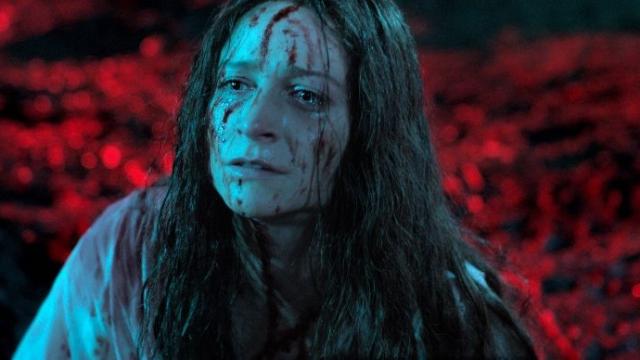On the surface, Censor — which had its world premiere at the 2021 Sundance Film Festival — is about a person we’re predisposed to hate: a film censor. A person who watches a movie and decides what’s appropriate for other people to watch. How dare they, right? What makes them so freakin’ special?
We start the feature debut of director Prano Bailey-Bond in that mind space. Enid (Niamh Algar) is a British film censor during the rise of “Video Nasties.” If you haven’t heard that term, it was originated in the early 1980s to describe violent, disgusting, low-budget horror films which began to gain popularity at the time. Enid’s job is to decide what stays in, what stays out, what can be released, and what can’t. Basically, she spends all day saying things like “Can fewer guts pour out of his stomach in that scene?” or “We need to cut back on the eye-gouging.”
It’s not a fun or glamorous job, especially for a woman who mysteriously lost her sister several years ago. But just as her parents finally decide to move on, Enid watches a film that triggers something in her. A film that, she believes, that could hold the secrets to her sister’s disappearance. If all you knew about Censor were those things alone, it’s already an interesting, original tale. How many 1980s period pieces are there about film censors with missing sisters who watch horror films for a living? After Enid sees the film in question, she begins an exploration into its origins, trying to figure out what, if any, connection it really has to her. And here, on the surface, is where Censor is the most flawed.
While the intrigue and discovery of the story never wanes, Enid’s journey feels a little soggy. Like she’s moving in slow motion. The potential in what she could discover is so great, it can get frustrating that she takes her sweet time getting there. As you’d hope though, Bailey-Bond goes beyond that. With each new step Enid takes, a deeper layer of meaning is revealed. We begin to question what impact the films are having on society. We consider what watching all these movies deemed unfit for others does to a person. We get an exploration of censorship, not just in films, but in the mind. What can a person block out to be able to cope with potentially traumatic memories? Then, what does that say about reality vs. fantasy? The list goes on and on.
Eventually, the seemingly stoic story and deeper philosophical explorations balance out, thanks in large part to the guarded, vulnerable performance of Algar as well as Bailey-Bond’s strong visual choices. Censor bounces between aspect ratios, going from traditional widescreen high-definition to 4:3 VHS quality and back again. Scenes transition through TV static, and throughout, deep pinks, reds, and blues give everything a dream-like state, almost begging the audience to question reality. So, as Enid eventually loses herself in this task, the audience does as well. We’re happy to go along for the ride no matter how manic or weird things get. And, my friends, things do get manic and weird, especially in the final act.
In the end, the best and worst things about Censor are exactly the same. It’s that all of its most fascinating ideas and concepts are on its margins — rarely does it make anything explicit or obvious. We have to make the connections ourselves which, sure, can be a little frustrating, but in a film called Censor is also rather remarkable. That so much feels implied rather than direct is almost a form of censoring in itself. And Bailey-Bond leaves plenty of breadcrumbs as to what she’s trying to say about trauma, memory, film, censorship, and more. It’s not a difficult nut to crack; she would just prefer everyone talk about it after, rather than hammer us over our head with it. Enid would probably cut that anyway.
While Censor had its world premiere at the 2021 Sundance Film Festival, it currently has no distribution. We’ll let you know more when we find out.
